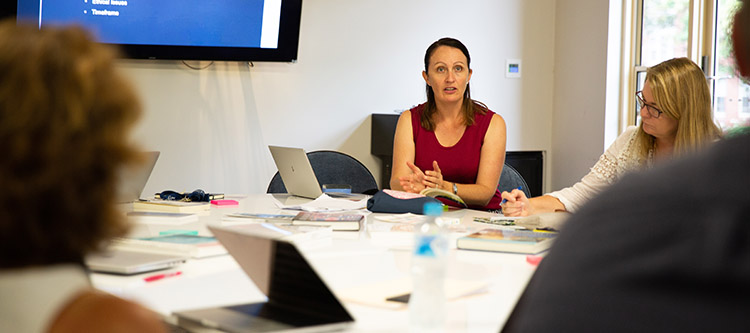How COVID-19 brought out the best in teachers – and new ways to engage our students
Tuesday 18 August, 2020
End of term is often a period of reflection for teaching staff – especially following a time of such enormous upheaval as we have all experienced by COVID-19 this year.
Moving Pymble’s teaching and learning online in the face of a pandemic, and then settling back into classrooms following government health advisories, has been a huge challenge for all of us in recent months. The teachers at Pymble Ladies’ College stepped up in a big way, said Joanne Mitchell, Deputy Head of Learning for Years 7 to 12.
“While the experience tested us all beyond our wildest expectations, I am so proud of the versatility of our teachers. Their willingness to upskill and teach in uncertainty has been wonderful,” she said.
“Our Pymble teachers remained dedicated to providing consistency and excellence for our students, going to extraordinary lengths to design and redesign lessons, and transform and implement practical innovations so our girls continued to learn while we operated online.”
Losing those informal face-to-face connections that happen in a physical space was hard for teachers and students – and outside the classroom, teachers also lost the opportunity for casual catch-ups with colleagues, where they would often run ideas and challenges past each other, share tips, support each other and suggest solutions.
“We needed to create a safe space where our teachers could commune, talk about lessons learned, share practical innovations implemented and discuss changes in practice,” Ms Mitchell said.
The Learning Series
Ms Mitchell and other classroom leaders invited Pymble teachers to join in a regular Learning Series, held each Tuesday at lunchtime, where they could share some of their ideas, lessons they had learned, and “celebrate learnings from mistakes made.”
Pymble teachers from right across the school community volunteered to host a presentation about creative and interesting things they had done to bring their lessons to life – so far, there have been 15 presentations made.
“We began to open up windows into our virtual classrooms and share pedagogical insights,” Ms Mitchell said, adding that teachers used Microsoft Teams and the Online Teaching Toolkit to voluntarily record insights into their resources and observations.
Highlights included Ms Shenaiya Day’s presentation about teaching French in Junior School, where girls virtually ventured down the River Seine and listened to French music in an immersive online experience. Students were so engaged in the lesson that all of them chose to do additional extension work.
Other teachers gave presentations about how to maintain classroom connections, about using an online tour of the Sistine Chapel to recognise shapes, and about boosting student engagement through virtual gallery walks. These were followed by in-depth discussions among teachers.
Another initiative during this time was the ‘Pymble Teach Meet’, with a small group of our teachers sharing a learning partnership with teachers from GEMS World Academy Singapore, who offered insights into their practises. Ms Mitchell said those conversations are continuing.
“Back in our physical classrooms, we are looking at our emerging digital skillsets and the valuable lessons learned about student engagement and asking: what can we do to further enhance this?”
“The Learning Series and Teach Meet are evidence of teacher humility, dedication to their students and a commitment to professional growth in partnership with others.”



